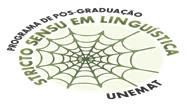Banca de DEFESA: AMAURI MORET DA SILVA
Uma banca de DEFESA de DOUTORADO foi cadastrada pelo programa.DISCENTE : AMAURI MORET DA SILVA
DATA : 31/05/2023
HORA: 15:00
LOCAL: On-line (Plataforma Meet)
TÍTULO:
PORTUGUESE LANGUAGE CLASSES FOR THE DEAF STUDENT: THE WORD OF THE SELF THAT TEACHES AND OF THE OTHER THAT LEARNS
PALAVRAS-CHAVES:
Teaching. Deaf Students. Specialized Educational Service. Libras. Portuguese Language.
PÁGINAS: 208
GRANDE ÁREA: Lingüística, Letras e Artes
ÁREA: Lingüística
SUBÁREA: Lingüística Aplicada
RESUMO:
This thesis is part of the Research line Studies of Processes and Social Practices of Language, of the Graduate Program in Linguistics, of the State University of Mato Grosso (UNEMAT), with the general objective of investigating which dialogical relations are established between the didactic-pedagogical practices used by two teachers, in a (virtual) room of Specialized Educational Service, of a Special Education school, located in the Municipality of Rolim de Moura, in the State of Rondônia (Brazil), and the legal documents (Decree n. 5.626/2005, Law n. 13.005/2014, Law n. 13.146/2015 and Law n. 14.191/2021), which provide for the Education of the Deaf. In this perspective, we sought to understand which conceptions of language and teaching sustain these practices, and how they can contribute to the learning of Libras and the Portuguese Language, in a Special Care classroom, in a remote teaching context. The study is based on Bakhtin's dialogic theory of language and the Circle, particularly on the concepts of dialogic relationships, concrete utterance and active and responsive understanding, in dialogue with deaf studies on sign language, deaf culture and education of deaf. The thesis is defended that the didactic-pedagogical choices made by teachers, as well as their conceptions about language and language, are fundamental for the teaching and learning process of deaf students, in Libras and Portuguese classes. In this sense, the hypothesis that supports this work resides in the didactic-pedagogical choices of these teachers, as well as in the conception of language and language assumed by these Libras and Portuguese Language professionals, showing how these questions are reflected and refracted in the teaching process, in the learning of deaf students. It is, therefore, a qualitative research, with a dialogic approach, guided by the following questions: 1) What didactic-pedagogical practices are used by two teachers of Libras and Portuguese Language to teach these two specificities, in a virtual room of specialized educational assistance to deaf students, from a special school in Rolim de Moura? What the conceptions of language, language and language teaching support the didactic-pedagogical practices used by two teachers of Libras and Portuguese for deaf students, in a virtual room of specialized educational assistance to deaf students, from a special school, located in the municipality of Rolim de Moura? 3) What types of dialogical relationships are established between the didactic-pedagogical practices used by these teachers, in relation to legal documents, and how these variants can contribute to the learning of deaf students? Regarding the methodological path, the data were generated from the observation of 18 classes, which took place via the Google Meet platform, recorded using the Screen Recorder Studio application. From these classes, we selected, based on the observed regularities and the research objectives, four excerpts for the dialogical analysis of the utterances, two Libras classes and two Portuguese classes. The results show that the teachers' didactic-pedagogical choices have a significant impact on the language teaching and learning process, but in a decontextualized and ineffective way for the practical life of deaf students. The Libras teacher tries to reconcile the teaching of this subject with that of the Portuguese language, but ends up not achieving either objective. The Portuguese language teacher prioritizes structural teaching, without taking into account the linguistic specificities of deaf students. For this reason, we state that Libras and Portuguese were not taken as teaching objects, since the focus in the educational process was the presentation of signs in Libras, as well as their meanings in written Portuguese, without really selecting specific contents of these two languages, during their learning. In addition, the conception of language and language adopted by teachers engenders a concentration on language only as a communication tool, which does not meet what the official documents propose, which indicate a bilingual, interactional, dialogical and bicultural teaching. The research data pointed to the existence of centripetal and centrifugal forces in the teachers' practices, since they sometimes directed the teaching of languages towards the acquisition of signs and their memorization, configuring a structuralist practice, centered on the code (centripetal forces), sometimes they had a practice focused on situations of use, seeking to establish connections with the students' daily lives, thus breaking with the monolingual approach, and seeking a social, interactive practice (centrifugal forces). These findings evidenced the dialogical relationships that were sometimes dissonant, sometimes harmonious in relation to official documents, which guide the teaching of Libras and Portuguese as a second language for the deaf people.
MEMBROS DA BANCA:
Presidente - 124919002 - ELIZANGELA PATRICIA MOREIRA DA COSTA
Interno - 83247001 - WELLINGTON PEDROSA QUINTINO
Externo ao Programa - 83191001 - NILCE MARIA DA SILVA
Externo ao Programa - 416.935.071-53 - SANDRA PATRÍCIA DE FARIA DO NASCIMENTO - UnB
Externo à Instituição - ANA CLAUDIA BALIEIRO LODI - USP



